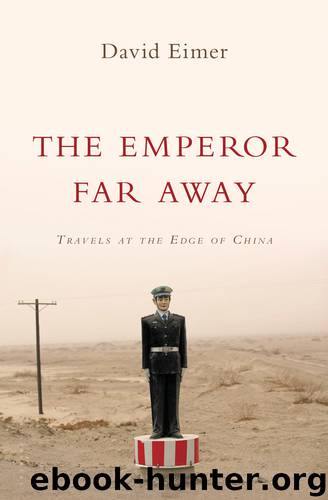The Emperor Far Away by David Eimer

Author:David Eimer
Language: eng
Format: epub, mobi
Publisher: Bloomsbury Publishing
Published: 2014-05-20T16:00:00+00:00
Part III
YUNNAN – TROUBLE IN PARADISE
The term savages, used by so many authors to denote all hill tribes of Indo-China, is very inaccurate and misleading, as many of these tribes are more civilised and humane than the tax-ridden inhabitants of the plain country and indeed merely the remains of once mighty empires.
Archibald Ross Colquhoun, Amongst the Shans (1895)
15
Shiny Happy Minorities
Early evening in Jinghong and the tour buses arrive in clusters at the town’s theatre. They disgorge group after group of Han visitors, who are shepherded inside by their guides for the daily performance. To the accompaniment of music with only a tenuous link to the old songs of the region, young and attractive ethnic-minority women sashay across the stage in body-hugging dresses, performing fake versions of their traditional folk dances.
The dance show is the single most popular part of any trip by Chinese tourists to Jinghong, the capital of the Xishuangbanna region, deep in the south of Yunnan Province. With Laos and Myanmar a few hours’ drive away, this is where China meets South-east Asia. People from across the country are drawn here by a combination of the tropical climate and the perceived exoticism of the local minorities.
An unspoken but intrinsic aspect of Xishuangbanna’s appeal for the Chinese is the reputation those ethnic groups have for being free and easy in their attitudes to sexuality, a vivid contrast with Han China where even talking publicly about sex remains something of a taboo. Alongside pictures of palm trees and elephants, the advertising used by the tour companies invariably includes tantalising photos of scantily clad, long-haired women bathing in the local rivers, or dancing gracefully in idyllic outdoor settings.
At one of Jinghong’s most popular restaurants, visitors can listen to a band while teenage girls in traditional costume showing off their bare midriffs go from table to table singing. Then they sit on the laps of the male customers and make them drink a glass of beer over their shoulder. It is a ritual from the wedding ceremony of the Akha people, appropriated now by the tourist trade to cater to Han fantasies of licentious minorities living in paradise.
Those dreams are rooted in what the CCP regards as fact. Until the communists seized power in 1949, the Han knew little about the borderlands of Yunnan except that they were home to numerous peoples whom they regarded as barbarians. When the CCP started to classify them in 1953, no fewer than 260 different groups came forward asking to be registered as ethnic minorities. That was far too many for the Beijing bureaucrats, who swiftly lumped many of them together into larger, more manageable units.
Even so, almost half of China’s fifty-five official minorities come from Yunnan, making it the most ethnically diverse region of China. It is also the most varied part of the country geographically. Taking up a large chunk of the south-west, Yunnan sprawls from the mountainous border with Tibet in the north, via temperate plains dotted with the remains of ancient kingdoms,
Download
This site does not store any files on its server. We only index and link to content provided by other sites. Please contact the content providers to delete copyright contents if any and email us, we'll remove relevant links or contents immediately.
Autoboyography by Christina Lauren(4679)
Asking the Right Questions: A Guide to Critical Thinking by M. Neil Browne & Stuart M. Keeley(4579)
Dialogue by Robert McKee(3585)
Eat That Frog! by Brian Tracy(3515)
Sticky Fingers by Joe Hagan(3455)
Journeys Out of the Body by Robert Monroe(2988)
Elements of Style 2017 by Richard De A'Morelli(2945)
Annapurna by Maurice Herzog(2842)
Schaum's Quick Guide to Writing Great Short Stories by Margaret Lucke(2806)
Full Circle by Michael Palin(2773)
The Diviners by Libba Bray(2444)
The Art of Dramatic Writing: Its Basis in the Creative Interpretation of Human Motives by Egri Lajos(2414)
The Mental Game of Writing: How to Overcome Obstacles, Stay Creative and Productive, and Free Your Mind for Success by James Scott Bell(2395)
Why I Write by George Orwell(2360)
Atlas Obscura by Joshua Foer(2350)
In Patagonia by Bruce Chatwin(2271)
The Fight by Norman Mailer(2160)
The Elements of Style by William Strunk and E. B. White(2077)
Venice by Jan Morris(2051)
